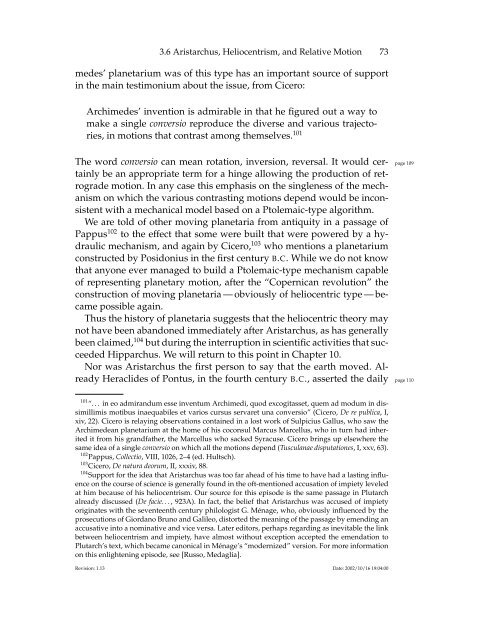1 The Birth of Science - MSRI
1 The Birth of Science - MSRI
1 The Birth of Science - MSRI
You also want an ePaper? Increase the reach of your titles
YUMPU automatically turns print PDFs into web optimized ePapers that Google loves.
3.6 Aristarchus, Heliocentrism, and Relative Motion 73<br />
medes’ planetarium was <strong>of</strong> this type has an important source <strong>of</strong> support<br />
in the main testimonium about the issue, from Cicero:<br />
Archimedes’ invention is admirable in that he figured out a way to<br />
make a single conversio reproduce the diverse and various trajectories,<br />
in motions that contrast among themselves. 101<br />
<strong>The</strong> word conversio can mean rotation, inversion, reversal. It would cer- page 109<br />
tainly be an appropriate term for a hinge allowing the production <strong>of</strong> retrograde<br />
motion. In any case this emphasis on the singleness <strong>of</strong> the mechanism<br />
on which the various contrasting motions depend would be inconsistent<br />
with a mechanical model based on a Ptolemaic-type algorithm.<br />
We are told <strong>of</strong> other moving planetaria from antiquity in a passage <strong>of</strong><br />
Pappus 102 to the effect that some were built that were powered by a hydraulic<br />
mechanism, and again by Cicero, 103 who mentions a planetarium<br />
constructed by Posidonius in the first century B.C. While we do not know<br />
that anyone ever managed to build a Ptolemaic-type mechanism capable<br />
<strong>of</strong> representing planetary motion, after the “Copernican revolution” the<br />
construction <strong>of</strong> moving planetaria — obviously <strong>of</strong> heliocentric type — became<br />
possible again.<br />
Thus the history <strong>of</strong> planetaria suggests that the heliocentric theory may<br />
not have been abandoned immediately after Aristarchus, as has generally<br />
been claimed, 104 but during the interruption in scientific activities that succeeded<br />
Hipparchus. We will return to this point in Chapter 10.<br />
Nor was Aristarchus the first person to say that the earth moved. Already<br />
Heraclides <strong>of</strong> Pontus, in the fourth century B.C., asserted the daily page 110<br />
101<br />
“. . . in eo admirandum esse inventum Archimedi, quod excogitasset, quem ad modum in dissimillimis<br />
motibus inaequabiles et varios cursus servaret una conversio” (Cicero, De re publica, I,<br />
xiv, 22). Cicero is relaying observations contained in a lost work <strong>of</strong> Sulpicius Gallus, who saw the<br />
Archimedean planetarium at the home <strong>of</strong> his coconsul Marcus Marcellus, who in turn had inherited<br />
it from his grandfather, the Marcellus who sacked Syracuse. Cicero brings up elsewhere the<br />
same idea <strong>of</strong> a single conversio on which all the motions depend (Tusculanae disputationes, I, xxv, 63).<br />
102<br />
Pappus, Collectio, VIII, 1026, 2–4 (ed. Hultsch).<br />
103<br />
Cicero, De natura deorum, II, xxxiv, 88.<br />
104<br />
Support for the idea that Aristarchus was too far ahead <strong>of</strong> his time to have had a lasting influence<br />
on the course <strong>of</strong> science is generally found in the <strong>of</strong>t-mentioned accusation <strong>of</strong> impiety leveled<br />
at him because <strong>of</strong> his heliocentrism. Our source for this episode is the same passage in Plutarch<br />
already discussed (De facie. . . , 923A). In fact, the belief that Aristarchus was accused <strong>of</strong> impiety<br />
originates with the seventeenth century philologist G. Ménage, who, obviously influenced by the<br />
prosecutions <strong>of</strong> Giordano Bruno and Galileo, distorted the meaning <strong>of</strong> the passage by emending an<br />
accusative into a nominative and vice versa. Later editors, perhaps regarding as inevitable the link<br />
between heliocentrism and impiety, have almost without exception accepted the emendation to<br />
Plutarch’s text, which became canonical in Ménage’s “modernized” version. For more information<br />
on this enlightening episode, see [Russo, Medaglia].<br />
Revision: 1.13 Date: 2002/10/16 19:04:00










